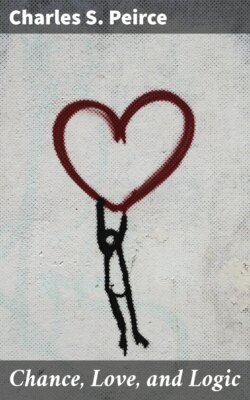Читать книгу Chance, Love, and Logic - Charles S. Peirce - Страница 8
На сайте Литреса книга снята с продажи.
IV
ОглавлениеTable of Contents
Not only the pragmatism and the radical empiricism of James, but the idealism of Royce and the more recent movement of neo-realism are largely indebted to Peirce.
It may seem strange that the same thinker should be claimed as foster-father of both recent idealism and realism, and some may take it as another sign of his lack of consistency. But this seeming strangeness is really due to the looseness with which the antithesis between realism and idealism has generally been put. If by idealism we denote the nominalistic doctrine of Berkeley, then Peirce is clearly not an idealist; and his work in logic as a study of types of order (in which Royce followed him) is fundamental for a logical realism. But if idealism means the old Platonic doctrine that “ideas,” genera, or forms are not merely mental but the real conditions of existence, we need not wonder that Peirce was both idealist and realist.
Royce’s indebtedness to Peirce is principally in the use of modern mathematical material, such as the recent development of the concepts of infinity and continuity, to throw light on fundamental questions of philosophy, such as relation of the individual to God or the Universe. At the end of the nineteenth century mathematics had almost disappeared from the repertory of philosophy (cf. Külpe’s Introduction to Philosophy), and Peirce’s essay on the Law of Mind opened a new way which Royce followed in his World and the Individual, to the great surprise of his idealistic brethren. In his Problem of Christianity Royce has also indicated his indebtedness to Peirce for his doctrine of social consciousness, the mind of the community, and the process of interpretation. It may be that a great deal of the similarity between the thoughts of these two men is due to common sources, such as the works of Kant and Schelling; but it is well to note that not only in his later writings but also in his lectures and seminars Royce continually referred to Peirce’s views.
The ground for the neo-realist movement in American philosophy was largely prepared by the mathematical work of Russell and by the utilization of mathematics to which Royce was led by Peirce. The logic of Mr. Russell is based, as he himself has pointed out, on a combination of the work of Peirce and Peano. In this combination the notation of Peano has proved of greater technical fluency, but all of Peano’s results can also be obtained by Peirce’s method as developed by Schroeder and Mrs. Ladd-Franklin. But philosophically Peirce’s influence is far greater in insisting that logic is not a branch of psychology, that it is not concerned with merely mental processes, but with objective relations. To the view that the laws of logic represent “the necessities of thought,” that propositions are true because “we can not help thinking so,” he answers: “Exact logic will say that C’s following logically from A is a state of things which no impotence of thought alone can bring about.”[21] “The question of validity is purely one of fact and not of thinking.... It is not in the least the question whether, when the premises are accepted by the mind, we feel an impulse to accept the conclusion also. The true conclusion would remain true if we had no impulse to accept it, and the false one would remain false though we could not resist the tendency to believe in it.”[22]
Since the days of Locke modern philosophy has been almost entirely dominated by the assumption that one must study the process of knowing before one can find out the nature of things known; in other words, that psychology is the central philosophic science. The result of this has been an almost complete identification of philosophy with mental science. Nor did the influence of biologic studies of the middle of the nineteenth century shake the belief in that banal dictum of philosophic mediocrity: “The proper study of mankind is man.” The recent renaissance of logical studies, and the remarkable progress of physics in our own day bid fair to remind us that while the Lockian way has brought some gains to philosophy, the more ancient way of philosophy is by no means exhausted of promise. Man cannot lose his interest in the great cosmic play. Those who have faith in the ancient and fruitful approach to philosophy through the doors of mathematics and physics will find the writings of Charles S. Peirce full of suggestions. That such an approach can also throw light on the vexed problem of knowledge needs no assurance to those acquainted with Plato and Aristotle. But I may conclude by referring to Peirce’s doctrine of ideal as opposed to sensible experiment,[23] and to his treatment of the question how it is that in spite of an infinity of possible hypotheses, mankind has managed to make so many successful inductions.[24] And for the bearing of mathematical studies on the wisdom of life, the following is certainly worth serious reflection: “All human affairs rest upon probabilities. If man were immortal [on earth] he could be perfectly sure of seeing the day when everything in which he had trusted should betray his trust. He would break down, at last, as every great fortune, as every dynasty, as every civilization does. In place of this we have death.” The recognition that the death of the individual does not destroy the logical meaning of his utterances, that this meaning involves the ideal of an unlimited community, carries us into the heart of pure religion.
